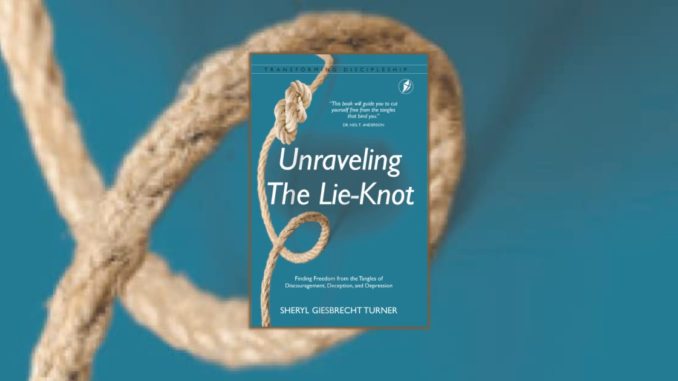
on May 8, 2021
Genres: Non-Fiction, Christian Life
Buy on Amazon
Goodreads

Learn how to "unravel the lie-knot!"
All of us are products of our upbringing and experiences, and, whether we realize it or not, have come to believe things that are not actually true. Those false believes hold us back. They are like recordings that play constantly in our minds,
condemning us, accusing us, shaming us, and blaming us. Is it possible to silence these thoughts in our heads that have tied us ijn knots for so long? Can we ever find peace?
Yes! The Bible promises we can be transformed by the renewing of our minds.
In Unraveling the Lie-Knot: Finding Freedom from the Tangles of Discouragement, Deception, and Depression, Sheryl Giesbrecht Turner offers biblical encouragement and hope for those who devote themselves to search out and find truth. On our own, we cannot undo lies we’ve believed since childhood. But God can. With the Holy Spirit’s help, we learn to untangle knots of deception, discover the lies behind our fears, dispel depression, and defeat the effects of trauma through studying and applying His word to our lives. You can learn how to “unravel the lie-knot.”
Unraveling the Lie-Knot is the kind of book that’s not bad, but its lack of audience clarity and amateur formatting present it in a way that makes it less compelling than it actually is. It’s rather odd for me to begin a review by talking about the book’s peripherals rather than its content, but how one experiences a book is a large factor in how one perceives a book. And as a self-published title (or, rather, published through the ministry for whom she works), this criticism is perhaps even more relevant.
Unraveling the Lie-Knot makes use of narrow margins that push text to the edges of the page. It does not indent paragraphs and instead uses a single-spaced gap. Comparing the book to another the exact same dimensions from an established, well-known professional publisher, Unraveling the Lie-Knot tops out at 36 lines on a page compared to 28. That’s almost 25% more text on one page. The book also uses a sans-serif font in the body of the text, which also makes the text less readable and is against typical industry standards. Combine this with several typographical errors and the end result is that, whatever Sheryl Giesbrecht Turner has to say, it comes in a poorly packaged container.
Once you unraveling the knots surrounded the message, Unraveling the Lie-Knot presents an encouraging, exhortative devotional for women struggling to overcome their past. Whether its false beliefs of inadequacy, past traumas or abuses, fears of failure or abandonment, or mental health issues, Turner’s message for women is that God’s abiding presence can lead you into wholeness and health. The book’s strength is its abundance of stories from women who have found freedom in Christ. Readers will come away from this book knowing they are not alone in their struggle and that others have been where they are and come through.
Unraveling the Lie-Knot moves sequentially from understand one’s knotted position through coming to a reliance on Jesus to countering common defenses against receiving help. Two whole chapters deal with the problems of self-reliance. Two chapters talk about why God should be trusted even if it seems like he’s been absent. It’s a journey from beginning to end, carefully and calmly unraveling the lies one knot at a time. Each chapter ends with individual or group study questions and a space for journaling one’s journey toward healing.
As for the writing, Turner is passable. The book is a bit bloated and could have used some sharper editing. Her illustrations are sometimes not as connected to the source material as she thinks it is and she has a habit of overexplaining the illustration while underexplaining the application. This book is also written specifically to a female audience—“Since you’ve picked up this book, I am picturing you, a woman like me, seeking a deeper walk with God” (p. 17)—but is nowhere marketed as such. Nothing from the back cover copy anything else suggests that Turner is writing for women only. Yet, that’s obviously her intended audience, not just from this opening sentence in the book but from gender comparisons she makes throughout the book. (At not ones that I agree with necessarily, but there’s no need to nitpick.)
Overall, Unraveling the Lie-Knot had the potential to be a strong book, but its structural problems and readability keep it from reaching the heights it should’ve. There are so many books on this topic that cover it more concisely and in a more readable format.
